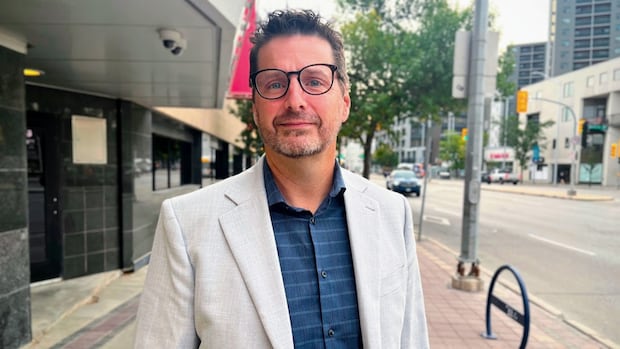Calls to restrict bail conditions have been amplified after a number of cases in Manitoba involving accused offenders who were released from custody while waiting for court dates.But restricting someone’s freedom isn’t as simple, or fair, as changing the law, says Manitoba provincial court Chief Judge Ryan Rolston.”It’s important to just take a step back and remember that we’re dealing with a pretrial process,” Rolston said in an interview with CBC’s Information Radio.Anybody charged in Canada, including repeat offenders, “is presumed innocent, and that presumption of innocence follows them all the way through until a judge or a jury finds otherwise,” he said.As well, bail is a constitutionally enshrined right in the Charter of Rights and Freedoms, he said.Among recent Manitoba cases raising questions about bail reform was the stabbing last week of several people in Hollow Water First Nation, one of whom died. The accused, Tyrone Simard, 26, was out on bail at the time.He was waiting for a court appearance on charges of assault with a weapon and mischief but had been released with conditions, including not having contact with four people police say he attacked on Sept. 4.In another case, also earlier this month, a group of four teens allegedly robbed a Walmart in Winnipeg and shot at a security guard with an airgun. Two of them were out on bail at the time.And on Tuesday, Progressive Conservative Leader Obby Khan called for bail reform as he stood with the parents of a woman killed in a collision with an alleged drunk driver in January.RCMP have said at the time of the crash, they had an arrest warrant for the driver on two counts of failing to comply with a release order. The accused “thumbed his nose at justice” earlier this month, when he walked away from a private treatment centre where he was granted bail to live as an in-patient, the Opposition said.The province’s legislature unanimously passed a motion to demand bail reform earlier this year, but Khan said Premier Wab Kinew’s NDP government has only pointed the finger of blame at the federal government on the issue.Pretrial detention can put lives into ‘chaos’: judgeChief Judge Rolston said police in Manitoba annually lay about 40,000 charges against thousands of individuals, many of whom face multiple charges.In Canada, an arrested person must be given a bail hearing within 24 hours, or as soon as possible after that, to determine whether they should be released or held until trial.”So it is a big daily task,” Rolston said, adding most people accused are granted bail and go through the court process without breaching their conditions.A challenge with bail hearings is that police often haven’t completed a full investigation yet, so the Crown, defence and judge don’t necessarily have all of the details, he added.Keeping someone in custody, unless there is a proven risk to the public or concern they could flee, is generally frowned upon, because there can be serious consequences if they are later proven innocent, Rolston said.”The time that people spend in pretrial detention isn’t something that is in any way returnable to them,” he said.”When somebody’s put in pretrial detention, you can see very quickly that their life is put into chaos. If they have a job, that job’s probably gone. In many cases, if they have a home, that home may well be gone.”And the presumption of innocence must be maintained even if a person has a long criminal history, Rolston said”You’ll hear lawyers argue, ‘There is a history here,’ but that’s not a strong case. They may have the wrong person here.”Some proponents for bail reform in Canada have suggested the onus should be on repeat offenders to prove why they should get bail.However, the Criminal Code already has provisions for that, Rolston said, adding many other amendments have been made in recent years to bail provisions.That’s not to say that there isn’t room for more, but it’s “a very complex issue,” and blanket changes to bail provisions can’t reflect individual situations, Rolston said. “It’s difficult to envision a world where bail is not a part of the system. It’s got to be.”‘Sensationalized instances’ not the norm: defence lawyerWinnipeg-based criminal defence lawyer Zilla Jones has advocated for bail reform for years, but not for the same reasons as those who want people kept locked up.She wants bail plans to better protect those in the system from further trouble when they get out.”Many times, people are set up to fail” when released on bail, she said.Generally, people entering the criminal justice system are from marginalized communities, or live with substance abuse or mental health issues, said Jones.”These are people coming to the criminal justice system often for crimes that stem from poverty and trauma. With bail, we’re asking people to provide the kind of structure and security in their lives that they’ve never had,” she said.Defence lawyer Zilla Jones wants to see bail plans that would better protect those in the system from falling further into trouble. (Travis Golby/CBC)To be released, an accused typically needs to provide police or the court with a confirmed address. That doesn’t work for people who are homeless, Jones said.”They’re being asked not to consume alcohol or drugs, when they may have an addiction that’s been longstanding and there’s no rehab that’s available.”Those who breach release conditions have often been forced into a flawed situation, said Jones. That’s the norm, not the recent headline-grabbing cases creating an uproar, she said.Those are “a few sensationalized instances” that shouldn’t be used as examples of the bail system, she said.Many offenders are youth who have been shunted around the foster care system and didn’t have parents who made sure they got up for school, did their homework and ate properly, Jones said.”And then they get a judge telling them, ‘You have to have a curfew. You have to be here, you have to do this.’ But there’s no one to remind them,” she said.”And they’re 13, 14, 15 years old, so they struggle with those conditions.”
Thursday, 5 Mar 2026
Canada – The Illusion
Search
Have an existing account?
Sign In
© 2022 Foxiz News Network. Ruby Design Company. All Rights Reserved.
You May also Like
- More News:
- history
- Standing Bear Network
- John Gonzalez
- ᐊᔭᐦᑊ ayahp — It happened
- Creation
- Beneath the Water
- Olympic gold medal
- Jim Thorpe
- type O blood
- the bringer of life
- Raven
- Wás’agi
- NoiseCat
- 'Sugarcane'
- The rivers still sing
- ᑲᓂᐸᐏᐟ ᒪᐢᑿ
- ᐅᑳᐤ okâw — We remember
- ᐊᓂᓈᐯᐃᐧᐣ aninâpêwin — Truth
- This is what it means to be human.
- Nokoma











